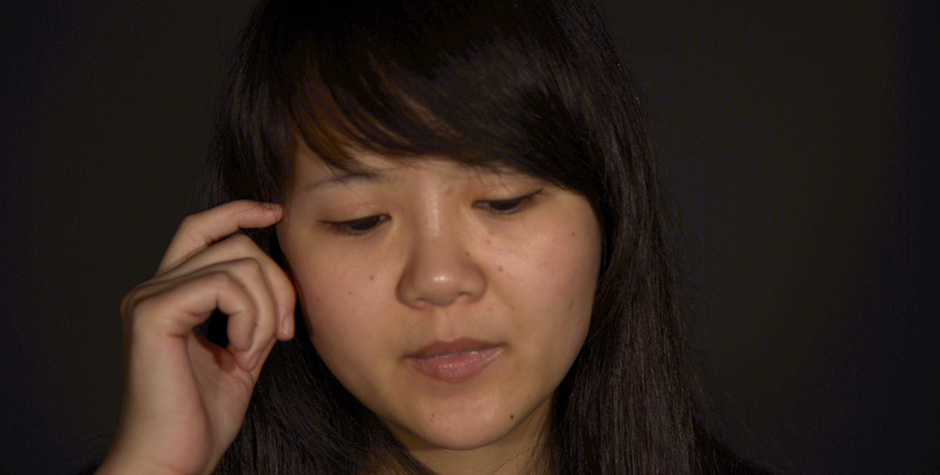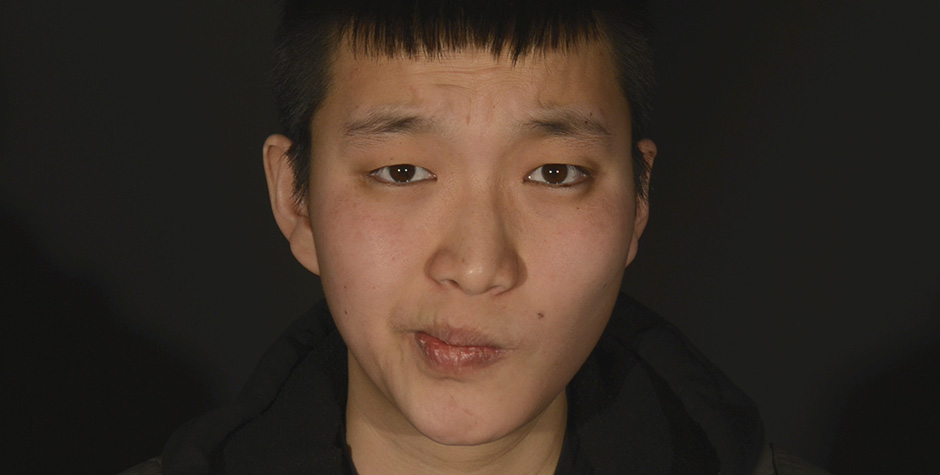
Written all over your face: Inside Allison Bolah’s revealing ‘Tell Me About Your Mother’ film series
Read the title of Allison Bolah’s ongoing video project, “Tell Me About Your Mother,” and you’re bound to think of Freud – of therapists and apron strings that want cutting, the well-worn grooves of habit and personality born in childhood. But Bolah’s not interested in excavating the sins of mothers.
Her project consists of a series of filmed interviews with people closest to her: friends, beloved colleagues and teachers, family members and loved ones. She’s done 25 so far and has plans for many more. Each piece starts with an interview and, as the title of the project suggests, with straightforward questions about her subjects’ mothers: Where is your mother from? Have you visited her childhood home? Does your mother have any siblings? What’s her job? Do you know what your mother was like at your age?
Her interview subjects’ faces are simply framed by the camera, situated against a black backdrop in a quiet room – just Bolah, off camera, and her sitter. But for the artist, the expressly stated content of the interview, what’s actually said out loud, isn’t at all primary. The spoken text, the transcript of both her questions and the subjects’ responses is edited out of the video. Her focus is on the interstitial nonverbal moments of such recollections: a wince at the corner of the eye, a ghost of a smile, an upturned glance or averted gaze. Bolah’s after the fleeting gestures of lived memory written on the face during the telling.
She says the idea for the work came to her when she was a grad student at Minneapolis College of Art and Design:
“We had quite a few international students in class at the time. And coming from faraway places, it’s natural to start getting to know each other by asking comforting questions, the kinds of questions that anyone can relate to, that transcend difference. We talked a lot about home and childhood. We found ourselves talking about our relationships with our mothers. Not the ‘tell me everything that’s wrong’ sorts of conversations – more like comfort food. We talked about our mothers as a way of talking about who we are, where we come from.”
And as she talked with all these people from different backgrounds, she says she found herself increasingly focused on their faces, the changing cast of their features and affect, as they spoke about their early memories. She became intrigued with the question of what personal narratives those expressive gestures, taken on their own, might reveal about the person speaking. She says these conversations with acquaintances at school got her thinking differently about what it means to know someone. “It made me think about what I don’t know about the people closest to me. And I wondered: If I had this conversation with everyone I’m close to, what would that yield?”
Bolah’s choice to eliminate the spoken parts of the short films is both artistically and personally driven. “There’s a level of trust there – these are people I love. I’m going to protect their stories,” she says. What’s more, each of her subjects goes into the interviews knowing their spoken accounts will remain private. What’s been surprising, she says, is that “even with the words cut out, your facial expressions make you vulnerable.” In the end, she says, “I feel like this is more revealing than a transcript.”
The artist has set rules for herself, lest she interject herself too much, subtly or overtly, into the nonverbal narratives that emerge from these personal film shorts: “I don’t shuffle things around in the editing process. They’re presented in the order they were interviewed. To make it through to the final film, it has to be a place [in the footage] where neither of us is talking – where I’m not asking questions, and they’re not answering them.”
Allison Bolah, still from Tell Me About Your Mother #2, multimedia, 2013. All media courtesy of the artist
She talks about the disarming intimacy of the interview process, the surprising eloquence of gesture and the visible traces of re-lived memory that move through a person’s face. As we wrap up our conversation, Bolah mentions a passage from Zora Neale Hurston’s novel, “Their Eyes Were Watching God,” about the distinct savor of that universal, pre-verbal hunger to know and be known, to truly see and be seen. The quote strikes me as perfectly apt: “They sat there in the fresh young darkness close together. Pheoby eager to feel and do through Janie, but hating to show her zest for fear it might be thought mere curiosity. Janie full of that oldest human longing – self revelation.”
I ask Bolah how her interviewees have responded to their resulting film shorts, and she laughs. “Everyone hates their own. This is like an extended portrait: facial expressions change, and the camera captures and makes immediate every stray, unconscious gesture. It’s hard to watch yourself that way.” But, she says, “to me, they’re all so beautiful – really gorgeous. These are people I already love, and I get to linger, to really see them. It’s such a privilege.”
Selections from the “Tell Me About Your Mother” film series by Allison Bolah will screen on a flat panel screen and by way of projections in (Knight Arts grantee) Wing Young Huie’s Third Place gallery, 3730 Chicago Avenue So., Minneapolis on Saturday, August 9 beginning at 7 p.m. Ping-pong and karaoke will follow. For more on the artist, visit her website at www.allisonbolah.com.
Recent Content
-
Artsarticle ·
-
Artsarticle ·
-
Artsarticle ·

